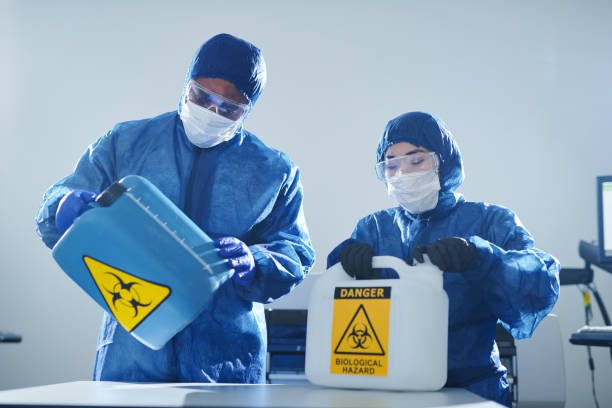
| Nuclear Technician Key Stats | |
|---|---|
| Avg. Salary / year | $92,120 |
| Avg. Pay / hour | $44.29 |
| Education | 4+ Years |
| Job Outlook | -7% |
Nuclear Technicians are a specialized type of Science Technician whose work revolves around helping scientists improve products and procedures using mathematical and scientific foundations.
Their work is based out of a laboratory where they help scientists by carrying out technological tasks.
They use nuclear physics in order to provide production, maintenance and quality control procedures.
People who want to become a Nuclear Technician can fall under two categories:
- Nuclear Equipment Operation Technicians
- Nuclear Monitoring Technicians
A Nuclear Equipment Operation Technician is involved in the Green Economy which has been experiencing tremendous growth for the past few years.
They assist scientists working in a lab by running equipment that releases, controls and uses nuclear energy.
A Nuclear Monitoring Technician performs their work out of a lab helping protect people from possible radiation exposure and notifying management when radiation exposure has reached the maximum allowable limit set by legal standards.
Table of Contents
Education Requirements to Become a Nuclear Technician
The educational requirements vary for the Nuclear Technician specializations.
Potential Nuclear Equipment Operation Technicians should focus on beginning a program that offers training or an Associate’s degree in the field.
These requirements can be met by attending and completing related courses at a Vocational School, Community College or a training program.
Helpful courses that prepare students to join the field include:
- Public Safety and Security
- Physics
- Engineering
- Technology
Those who want to focus on becoming a Nuclear Monitoring Technician need at least an Associate’s or Bachelor’s Degree with an emphasis on Nuclear Technology or similar educational background.
Some common types of classes needed to fulfill this educational background include:
- Chemistry
- Nuclear Physics
- Electricity
- Mathematics courses
Gaining experience with on the job training is an alternative route that someone who wants to become a Nuclear Technician can take.
The best way to do this is by joining a branch of the Armed Forces, more specifically, the US Navy which manages nuclear ships.
Because of the radioactivity involved, those who want to become a Nuclear Technician should be trained to handle dangerous material and learn safety procedures in order to keep other employees and the public safe.
Nuclear Technician Job Description
Both specializations under Nuclear Technicians work with and can be exposed to radiation.
Their primary job is to make sure radiation is kept below the legal minimum in order to ensure safety to other individuals.
Nuclear Technicians provide assistance to Nuclear Physicists and Engineers in researching information; they do this by running testing equipment.
They are also responsible for monitoring radiation levels and using remote controlled technology to handle material exposed to radioactivity or radioactive material itself.
Nuclear Technicians should be aware of and implement safety protocol in order to handle radioactive matter.
The two types of Nuclear Technicians have responsibilities that vary in nature.
Nuclear Monitoring Technician: This position is mainly responsible for the collection and testing of samples in order to find the results from nuclear testing and determining whether any unnecessary or unwanted contamination was experienced by the facility, environment or whether human exposure was caused.
Nuclear Equipment Operation Technician: This position will assist scientists working in a lab by operating equipment to manage nuclear energy.
They are responsible for the controlling and releasing of nuclear energy.
Nuclear Technician Salary and Career Path
The median salary for those specializing as Nuclear Monitoring Technicians is approximately $67,000 per year.
The salary range for this position is from approximately $41,000 to $92,500 per year depending on experience.
For Nuclear Equipment Operation Technicians, the median salary is a bit lower but not by much at $66,000 annually, the starting salary for this position begins at approximately $40,000 and can go as high as $92,000 annually for experienced technicians.
Median wages represent national statistics and can vary throughout states.
The job outlook for Nuclear Technicians seems to be as healthy as other industries.
It is expected to grow at a steady rate providing many job opportunities.
As with many other industries, employers look for candidates that have completed an education program and that have acquired a degree from a technology program.
The benefits of acquiring an Associate’s degree to become a Nuclear Technician can pay off with the expected income a candidate can expect to earn.
![]() The below information is based on the 2021 BLS national averages.
The below information is based on the 2021 BLS national averages.
National Average Salary
$95,200Average Salary by State
| State | Avg. Annual Salary |
|---|---|
| Alabama | $92,120 |
| California | - NA - |
| Georgia | $93,780 |
| Illinois | $121,020 |
| Michigan | $116,160 |
| New York | $107,210 |
| North Carolina | $99,710 |
| Ohio | $84,190 |
| Pennsylvania | $92,630 |
| South Carolina | $91,700 |
| Tennessee | $78,370 |
| Texas | $93,220 |
| Utah | $53,050 |
| Virginia | $93,740 |
The top earning state in the field is Illinois, where the average salary is $121,020.
These are the top 5 earning states in the field:
* Employment conditions in your area may vary.
Frequently Asked Questions
What does a nuclear technician do?
A nuclear technician is a specialist who works in the field of nuclear energy.
There are a lot of different types of nuclear technicians.
Nuclear reactor operators, for example, control and maintain the nuclear reaction process and help to load and unload the nuclear fuels; they usually work at remote-control instrument panels.
Those who set up and control particle accelerators are called ‘accelerator operators’.
The main duty of health physics technicians (radiation monitors) is to measure and monitor the radiation levels of equipment and of work areas; these specialists also keep records and enforce safety regulations.
Nuclear technicians can work in other industries as well.
The specialists can be hired to measure radiation levels in the environment, plenty of nuclear technicians work in the health field, and so on.
How much do nuclear technicians make?
On average, a nuclear technician can make a little less than $63.000 per year in the United States.
In case you decide to follow this career path, you can expect to earn anywhere between $35.000 and $101.000 annually.
The salary would certainly depend on a variety of factors – your education and experience level, the employer, the location and so on.
Nuclear technicians that work in South Carolina, for example, have the highest average salaries.
An entry-level nuclear technician can expect to earn $19 per hour, while specialists with years of experience can make $47 per hour.
How much does it cost to become a nuclear technician?
You would, in most cases, need an associate’s degree in nuclear technology, nuclear science, or a related field, in order to become a nuclear technician.
A year in a university can cost you anywhere between $8.000 and $45.000 (and more); the cost depends on a variety of factors (the books, supplies, and accommodation expenses are not included).
To improve job perspectives, you can go for a bachelor’s degree in nuclear engineering (in most cases, up to $43.000 per year).
Those who want to become nuclear physicists should have a doctorate degree in physics ($36.000-$49.000).
Nuclear reactor operators must be licensed (over $300).
What is the demand for nuclear technicians?
Between 2018 and 2028, the nuclear technician job market is expected to shrink by 4%, according to the Bureau of Labor Statistics.
That certainly is slower than the national average for all occupations in the United States.
The number of positions in the industry is, in most cases, limited by state and federal government.
The candidates that possess a degree and years of experience will have the best job perspectives.
However, it is expected that nuclear plants will come under increasing pressure from alternative sources of energy.
How long does it take to become a nuclear technician?
It will take you 2 years to obtain an associate’s degree.
A bachelor’s degree will take you 4 years to acquire, in case you decide to go for one, while a doctorate degree will require 3-7 years.
It will take you about a year of job experience to qualify for the nuclear reactor operator license exam.













